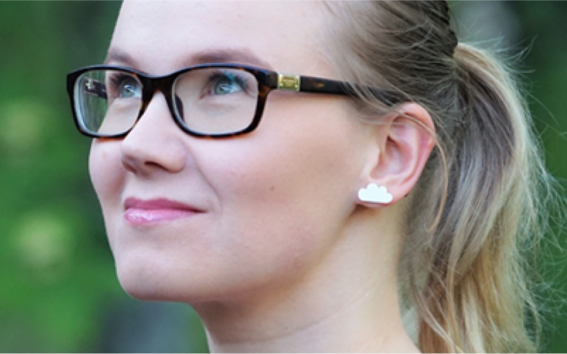Mira Hulkkonen
"By relying on your own skills, you can have great adventures and build a dazzling career. Choosing a field of study does not close doors or lock in future opportunities".

What have you studied and how did you end up with this option?
I have studied meteorology at the University of Helsinki, and in Switzerland at the University of Bern and the Zurich University of Technology. In elementary school, I read about climate change for the first time, and the topic fascinated me even then in all its complexity. I wanted to get the strongest possible foundation in natural science from my studies and learn to understand climate change in a versatile way. Meteorology combined mathematics, physics and chemistry, in addition to which climate change studies also included environmental economics and climate policy. I did my second master's degree in science communication at the University of Oulu, because communication management is essential when dealing with climate issues.
How did you become a climate change researcher?
During my studies, I already worked summers as a researcher in a research group. After graduation, I wanted to see what kind of work is being done around climate change, and I got a job working with renewable energy in some large planning and consulting firms. I have worked for cleaner energy all over the world, from tapioca fields in Thailand to snowy Lapland. However, the idea of writing a dissertation had remained in my mind and I wanted to delve into climate change even more. Research work has always interested me, but I also want to know what happens outside the university walls. There is room for several interests, and people don't need to be compartmentalized into doing only one type of work.
What is the best thing about your job?
The meaningfulness of the work is really important to me. The fact that I can contribute to the fight against climate change with my own work. Sometimes when coding something small, the connection can seem distant, but every day I remember the importance and meaning of my work, and that motivates me. I couldn't imagine doing work that lacked this meaningfulnes. With my work, I want to be involved in tackling major global challenges.
What have been the highlights and most important learnings of your career so far?
When I was 25 years old, I was working as an expert in Bangkok, training local experts. The experience was eye-opening, because there the work tasks of women my age were mainly copying paper in the office and the hierarchy was really obvious. After that, I no longer take it for granted that a young woman in Finland can be an expert who is really listened to. One of the highlights of my career has also been the fact that I have been able to see the implementation of real stuff in the fight against climate change up close. For example, I have stood on top of a wind turbine over a hundred meters high, on a wind farm, that I had helped design.
What do you expect from the future?
I want to continue working on things that are meaningful to me. I also want to keep my work versatile. When I was young, I was a figure skater who loved math and writing. I'm going to stick to this versatility and avoid getting boxed in a category. In working life, you must be ready to develop and study throughout your career. You are never ready, but to be successful you must be willing to learn new things. I would also hope to to see the day when the climate change crisis is solved and I could do something completely different with my career.
For whom is this a suitable career option?
An interest in science is essential for working in meteorology and climate change. However, everything can be learned and different people are needed in this field too. Renewable energy, for example, is important in the fight against climate change, but you don't change the world through technology alone without a really wide range of people doing it. You need different ways of thinking and seeing the world. I think the willingness to work for a cause is the most important thing of all.
What greetings would you like to send to a young person considering a career?
Be brave and creative! Personally, I've always said yes to challenges and thrown myself into things. I can't think of a single case where it didn't pay off. Even during your studies, you can be brave enough to choose things that interest you and combine them in creative ways, and as a result you can be truly unique as an employee. You can be creative and brave when you apply for a job, and you shouldn't think too narrowly about your own education. I would take a cue from the United States, where studies are more about thinking and learning skills than a degree that defines your entire career. By relying on your own skills, you can have great adventures and build a dazzling career. Choosing a field of study does not close doors or lock in future opportunities.